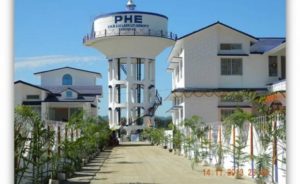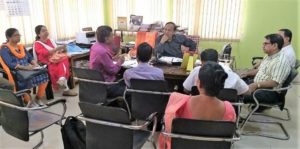
Assam has been the hotspot of water criticality since ages. At the end of March, 2018, PWS is available to around 45.8% as estimated from MDWS data and only 2.03% of household has access to PWS in household premises. The State has the advantage of receiving more rainfall than most parts of India and both surface and ground water is available abundantly except in the hill areas. However, the state is heavily dependent on ground water for drinking water supply and the same is mostly drawn through tube wells, generally from a shallow depth, particularly through private sources. There are three to four very important groundwater potential zones which discharge huge amount of water for human uses. Therefore, the state has ample scope to meet the goals related to water under the SDG (Goal 6.1). Along with improving access to piped water supply, ensuring supply of proper quality of water from public sources and putting in place a proper system of Water Quality Monitoring and Surveillance (WQMS) as per guidelines of the MDWS is another area of concern for the state.

Assam Public Health Engineering Department (APHED) is responsible for providing drinking water to the entire rural population, which was 2.68 crore as per 2011 census. Efficient implementation of the schemes, particularly completing the schemes without cost and time over-run, proper O&M of the commissioned schemes for sustained supply of water and ensuring quality of water supplied are the critical result areas for the department. The main objective of study was that, the Government of Assam (GOA) is keen to improve performance of the PHE Department, particularly in implementation of the NRDWP, so that it can meet the challenge of providing universal and equitable access to safe and affordable drinking water for all by 2030, as per the SDG (Goal 6.1). SIGMA Foundation took up the challenging study and has successfully recommended an expert set of guidelines for the strengthening of APHED.

SIGMA officials had rigorous interaction with the key officials of APHED for rapid assessment of the problems. In-Depth-Interviews (IDIs) of the key officials at different tiers of the organization were conducted for the enrichment of the concept. The present functioning and organisational structure of APHED was understood thoroughly to get to the grass root of the problem.
SIGMA Foundation has competently put forth a set of recommendations regarding issues related to Execution of Work at all the organisational tiers of the system. The demand and utilization of funds has been given a new shape by the expert group. Strengthening of supervision and monitoring for good and effective governance has been brought into lime light. Enhancing IT skills and proper maintenance of IMIS data has been encouraged. HR management and Capacity Building of the same was identified as another important sector and recommendations to resolve the same was provided efficiently by the team. There were some other identified factors which has also been given a restructured shape by SIGMA Foundation.
